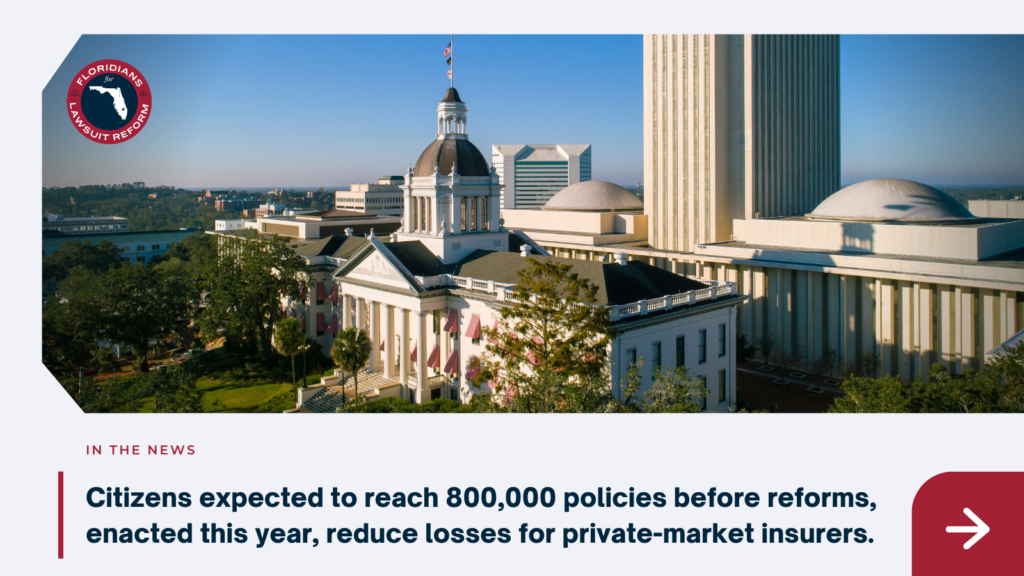By RON HURTIBISE SOUTH FLORIDA SUN SENTINEL | JUN 24, 2021 AT 10:37 AM

The state-owned “insurer of last resort” added more than 100,000 new policies between February and May — a result, officials say, of an ongoing customer purge by private-market companies looking to shed policies that are most likely to generate costly claims.
Citizens Property Insurance Corp., created to ensure Floridians can find insurance when no one else wants them, is becoming the only choice for customers whose prior companies declined to renew their policies or hit them with premium increases steep enough that they became eligible to switch.
The sharp policy growth, just as hurricane season gets underway, increases the risk that Citizens’ $6.4 billion surplus won’t be able to cover all claims if a catastrophe strikes South Florida or other populated areas of the state. If that happens, Citizens customers and potentially all property insurance customers in Florida would have to pay special assessments to cover any shortfall.
“The market is upside down,” said Ryan Papy, president of the Palmetto-based agency Keyes Insurance. “We are writing hundreds of Citizens policies each month. Roughly 90% of our new policies are [with] Citizens. Unfortunately, we are now seeing current clients being channeled to Citizens.”
Citizens added 103,972 new customers from February to May, including 54,770 from Broward, Palm Beach and Miami-Dade counties. Further growth is expected through 2022, industry officials say.
The newest customers came from companies with large market shares in South Florida, according to a list compiled by Citizens. Topping the list were Universal Property & Casualty (3,136 customers), People’s Trust (2,459), Florida Peninsula (2,260) and Federated National (1,972), and United Property & Casualty (1,900). Those totals could be larger because sales agents listed the prior insurers for just 45% of new customers.
Dulce Suarez-Resnick, vice president at Miami-based Acentria Insurance agency, said that “in the 36 years that I have been an agent in South Florida, the market has never been this bad — not even in 2006 and 2007 after the 2004-2005 hurricanes when eight storms crisscrossed our state.”
Citizens has been growing since the third quarter of 2019, when its policy count bottomed out at 423,000. That milestone marked the end of a seven-year decline from a peak of 1.5 million policies in 2012.
As of June 18, the company was back up to 626,607 policies and increasing by about 6,000 a week.
“The industry is facing a real dilemma,” Citizens president and CEO Barry Gillway told the company’s Market Accountability Advisory Committee on Wednesday. “Their profitability remains at an unsustainable level.”
Florida-based insurers have been losing money on operations for five years, Gilway said. Combined, they posted net operating losses totaling $1.6 billion last year and $269 million this year, he said.
Insurers blame a decade-long increase in costly lawsuits in South Florida, heavier-than-expected claims after hurricanes Irma and Michael and other recent storms, and an explosion of roof damage claims in the Orlando area and southwestern region of the state.
Those factors also contributed to increases in costs of reinsurance, which is insurance that insurance companies must buy to ensure they can pay all claims after a catastrophe. Reinsurers often require insurance companies to balance their exposure by reducing concentrations of policies in high-risk areas.
In 2020, many customers were shocked to receive notices that their rates would be increased as high as 45%, that their policies would not be renewed because they were deemed too risky, or that their homes had to pass inspections to retain eligibility for coverage.
In May, state insurance regulators allowed Universal Insurance North America, Gulfstream Property & Casualty and Southern Fidelity to cancel or send nonrenewal notices to more than 50,000 customers. So far, Citizens has absorbed about 3,000 of those policies, Gilway said.
Homes ripe for rejection include those with older roofs, homes that don’t meet current building codes, and homes with older plumbing or electrical systems, said Paul Handerhan, president of the consumer-focused Federal Association for Insurance Reform. Homeowners with bad credit or who filed claims in the past could also be abandoned, he said.
Sometimes, insurers will drop policies solely because they need to reduce their concentration of policies in high-risk geographic areas, like South Florida, home to 54% of Citizens’ policies.
Gilway expects Citizens to reach 800,000 policies through the first quarter of 2022 before reforms enacted by the state Legislature and Gov. Ron DeSantis this year reduce losses for private-market insurers.
Among those reforms are measures meant to make Citizens less attractive to customers considering switching from their current insurers.
One that takes effect July 1 will disqualify some policyholders from switching by requiring that a competing offer exceed Citizens’ rate by 20% instead of the current 15%. Another will increase the cap on Citizens’ average annual rate increases, now 10%, by a percentage point each year until it reaches 15%.
